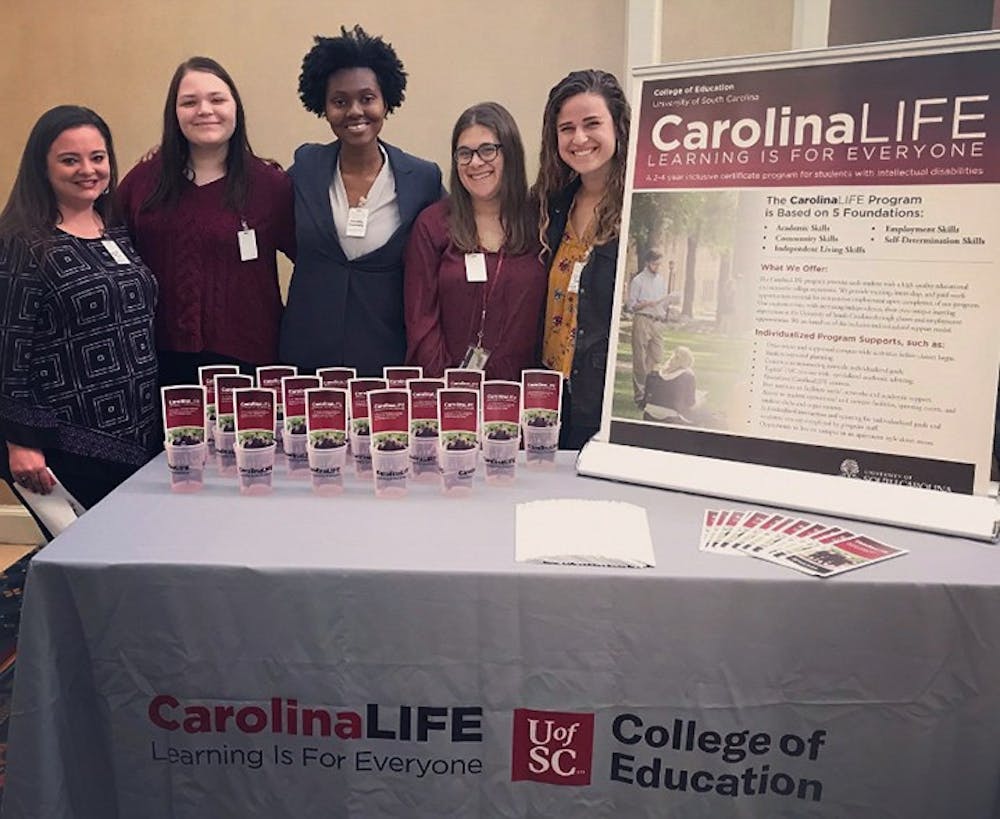Across from Russell House and past the ever-buzzing Greene Street, the CarolinaLIFE living and learning community is nestled away in Woodrow.
CarolinaLIFE is a non-degree program at USC that serves students with “diverse learning needs,” according to its website. When then-board of trustees member Donald Bailey was able to secure both funding and support in 2007, CarolinaLIFE became the first program of its nature in the state of South Carolina.
“The program has been an amazing experience, and I'm very glad that I get to be a part of it,” fourth-year CarolinaLIFE and special education student Riley Lewis said.
CarolinaLIFE is a four-year program that allows students to take both general USC and CarolinaLIFE-specific classes. Students audit USC classes that interest them so they are still able to pursue a major.
“We are a program for people with disabilities — there is no mistaking that,” CarolinaLIFE Program Director Chelsea VanHorn Stinnett said. “But whether you have an intellectual disability, a learning disability, a developmental disability, it's more so about the support and support needs.”
Student support needs are met in the classroom by CarolinaLIFE small group classes that develop their independent living skills, such as budgeting, healthy relationships and nutrition.
Outside of the classroom, students work weekly with coaches to help them keep up with their academics. Students also have personal development time with a coach where they can discuss non-school related topics in their life.
CarolinaLIFE provides 24/7 support and its own resident mentors, which spend more time with students than general USC resident mentors do. Because of these extra measures, CarolinaLIFE students pay a $1,800 CarolinaLIFE-specific fee in addition to USC’s in-state tuition rates, which all students now automatically receive.
With a 13% acceptance rate, which translates to about four to eight new students each year, CarolinaLIFE is difficult to get into.
“We want to accept individuals who have a clear idea of why they want to go to college,” Stinnett said. “It’s less about a very tangible idea of what they want their future to be, because that’s what we do — we help people figure out what that big picture is going to look like.”
Lewis has figured out what she wants her big picture to look like.
“Something I'm passionate about is my major in special education. I love the idea of working with young children who have autism just like I do,” Lewis said. “Hopefully, I can be some sort of hope to these kids who also have it, and aren’t as open about it as I am.”
On campus, Lewis loves to cheer on USC athletics and particularly enjoys football games. She describes herself as laid back and slow to anger, and she says she loves to make people laugh. She feels at home at USC and has never gotten the impression that anyone has treated her differently because of her autism.
“My parents, the way I was brought up, they never sheltered me or anything like that,” Lewis said. “They just helped me ... understand that the world is not going to conform to me. So, just take it in stride and go with what I've got.”
Along with Lewis, second-year CarolinaLIFE student Rhiannon Dalosto also hopes to pursue a career in special education. Dalosto, who has a learning disability and is part of USC’s color guard, said she has lots of friends both inside and outside of the CarolinaLIFE program.
“It is one of the best programs to ever go to,” Dalosto said. “For me, it was the right place to choose, and everyone is just so accepting and nice and friendly, and they welcomed me with open arms.”
Stinnett said her students just want to build authentic friendships with people.
“If you want to develop a friendship with someone and you see that maybe they're a little different, just be patient and reach out to us for support if you need it,” Stinnett said. “But, you know, just be a good human.”

